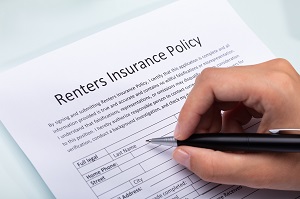WEDNESDAY, JANUARY 12, 2022
Whether you call a rented house, condo or apartment your home, you can benefit from renters insurance. This is essential coverage for anyone who leases their residence, and it provides the coverage that is essential to enable the tenant to protect themselves, their family, their property and their financial security within their rented home. It is so important, in fact, that many landlords or property managers require tenants to purchase coverage as part of their leasing agreement.
Still, all too often, tenants find it difficult to understand precisely what coverage renters insurance will include, and how exactly this coverage will assist them. Let’s take a closer look at this benefit, and the standard coverage examples that will apply within most policies.
Why Do I Need Renters Insurance?
Just because your landlord has their own insurance coverage doesn’t mean that you don’t need your own. In most cases, your landlord's insurance policy covers only structural damage to the building itself, along with the landlord’s own liabilities assumed by leasing the property.
Renters insurance is more specific to the tenant themselves. It protects your possessions in case of a covered loss from fire, smoke, lightning, vandalism and theft. It also extends beyond on-premises theft and hazards, covering property that is stolen from your car, or is lost or damaged anywhere you happen to be. It is therefore coverage for your own belongings, uniquely.
Is Coverage Affordable?
Because renters insurance covers only the value of your belongings, not the building, the premium is relatively inexpensive compared to a standard homeowners insurance. Usually, policies cost less than $20 per month. For about the same cost as going to the movies once a month, you can gain peace of mind, regardless of life’s unexpected mishaps. That’s something that anyone can afford. 
Getting the Right Policy, And How To Know You Have It
What do you think your belongings are worth? Any value is valuable to you, after all. Without renters insurance coverage, replacing these items could be a real financial hardship. With renters insurance, you are covered.
Plus, if you have valuables such as expensive jewelry or collectibles, an endorsement to a renters insurance policy can add to the policy’s provisions for possessions coverage. This means that in the event of a covered loss, the amount of insurance you have is enough to cover the repair, replacement or cash reimbursement of the items in question. That means that your expensive camera equipment or wedding ring can be covered, in addition to your clothing, furniture and other essential items.
Plus, you’ll need to insure yourself against liabilities present on your property as well, and that means buying coverage that you will use to take responsibilities for mistakes that you make that impact others.
Personal Property Insurance & Liability Insurance For Renters
Renters insurance provides protection against both property loss and liability if you cause injury or property damage to third parties. We've covered the basics of these benefits below:
Part I: Property Protection
Renters insurance covers your possessions against damage for things such as fire, smoke, lightning, vandalism, theft and water damage—but not flooding—to name a few. These are usually events that you can’t predict, but that can prove devastating to your home, nonetheless.
Part II: Liability Coverage
In addition to protecting your personal property, renters insurance also protects you if you are responsible for injury or property damage to others (even when those accidents were unintentional). That means you’ll likely be protected if someone slips and sprains their ankle at your annual birthday bash. Liability coverage also provides coverage for legal defense costs and judgments in a lawsuit, whether the incident occurred within your rented residence or elsewhere.
Property Insurance Coverage Options
There are two personal property coverage options to choose from: replacement cost value or actual cash value.
We recommend insuring your personal property for its replacement cost value. Here’s an example to illustrate the difference:
The furniture you bought a few years ago for $650 is now worth only $100, but today costs $900 to replace. With an actual cash value policy, you would get reimbursed the current depreciated cost minus your deductible. However, if you have replacement cost for your personal property, you would collect the full cost to replace the furniture, less your deductible.
The longer you own your belongings, the less value they hold. Replacement cost value ensures that you can replace yesterday’s purchases at today’s prices, no matter how old they might be.
If you rent in Georgia and would like to get an affordable renters insurance quote, submit a form or call us today at 877-997-2478!
No Comments
Post a Comment |
|
Required
|
|
Required (Not Displayed)
|
|
Required
|
All comments are moderated and stripped of HTML.
|
|
|
|
|
|
NOTICE: This blog and website are made available by the publisher for educational and informational purposes only.
It is not be used as a substitute for competent insurance, legal, or tax advice from a licensed professional
in your state. By using this blog site you understand that there is no broker client relationship between
you and the blog and website publisher.
|
Blog Archive
2024
2023
2022
2021
2020
2019
2018
2017
2016
2015
2014
2013
2012
|